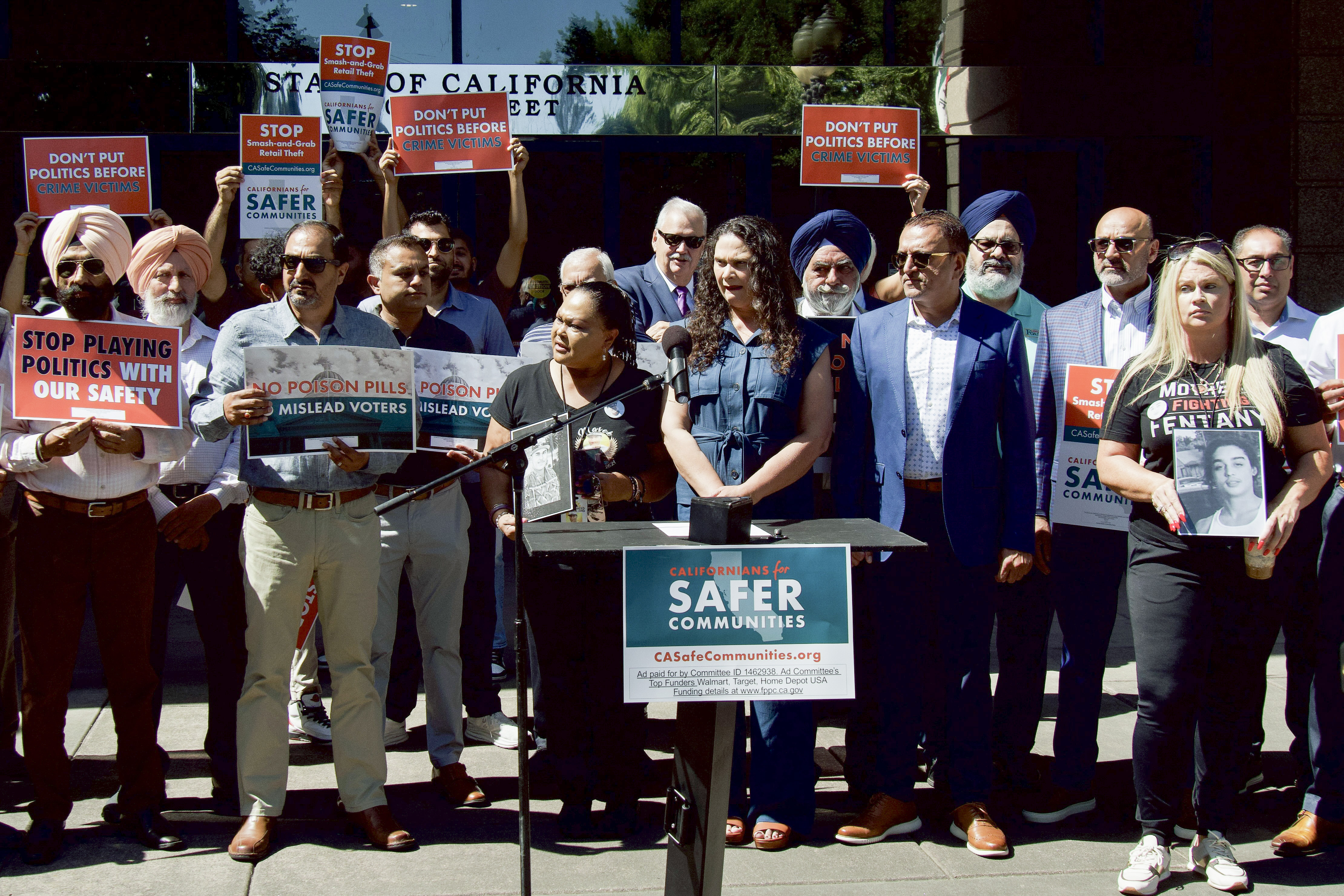Approximately 71 percent of likely voters in California support Proposition 36, the citizens’ initiative that would repeal some criminal justice reforms enacted by voters a decade ago, according to a survey released on Sept. 19 by the nonpartisan Public Policy Institute of California (PPIC).
Prop. 36—known as the Homelessness, Drug Addiction, and Theft Reduction Act—would increase penalties for repeat offenders of some drug and theft crimes.
The proposition aims to amend laws set by Proposition 47—which voters passed in 2014 to reduce prison populations by changing some crimes from felonies to misdemeanors.
Support was recorded in all demographic groups.
“Everyone across the board seems to be in support,” Deja Thomas, a survey analyst with the institute, said in response to a question from The Epoch Times during a webinar announcing the findings.
Most respondents who identified as Democrats, Republicans, and independents said they plan on voting for Prop. 36, with 63 percent, 85 percent, and 73 percent approving, respectively.
Regardless of ideology, region of the state where they reside, gender, race, age, presence of children in the household, education level, household income, place of birth, and whether they own or rent their home, support from those surveyed was widespread.
“While there are subgroup differences, overall, there’s solid majority support,” Dean Bonner, associate survey director and senior fellow at the policy institute, said during the webinar.
Males were 8 percentage points more likely to vote yes than women—75 to 67 percent—and Latinos were more likely to vote yes than any other race, with 75 percent expressing support.
High school graduates with no college education were most in favor of the proposition, with 81 percent supporting it, while 67 percent of those with some college and 70 percent of college graduates said they would vote yes.
Households with the smallest income levels were the least likely to vote yes, at 65 percent, compared with 76 percent of those making between $40,000 and $80,000 saying they approve and 72 percent of households making more than $80,000 in favor.
The age of respondents had the most variability, with 61 percent of likely voters between the ages of 18 and 44 supporting the proposition, while 77 percent of those 45 or older reported they would vote yes.
Survey respondents also said Prop. 36 is the most important of the 10 ballot measures—including five voters’ initiatives and five constitutional amendments presented by the Legislature—set for the November election.
“Proposition 36 on crime sentences currently leads in support, interest, and importance among the 10 state propositions,” Mark Baldassare, PPIC Statewide Survey director, said in a statement accompanying the survey.
Twice as many individuals chose Prop. 36 as their priority, with 26 percent most interested in it, compared with about 13 percent for Proposition 4—a safe drinking water bond measure—and Proposition 33, which expands government authority to enact rent control laws.
The survey was conducted online between Aug. 29 and Sept. 9, and 1,605 Californians—including 1,071 likely voters—were questioned. Researchers calculated a margin of error of 3.1 percent for all respondents and about 3.7 percent for those who intend to vote.
Proponents of Prop. 36 say the measure is needed to address the effects of Prop. 47. According to the Yes on 36 campaign website, the measure is backed by hundreds of local businesses, hundreds of local governments and officials, more than a hundred business organizations, more than a hundred law enforcement officials, and dozens of community groups.
Opponents say Prop. 36 could prove too costly and negatively affect the state by shifting funds from community programs to prisons.
“Supporting Prop 36 means diverting funds away from education, mental health, substance use treatment … and more,” Monica Montgomery Steppe, San Diego County supervisor, said in a Sept. 4 post on social media platform X. “We must choose progress, not regression. I stand for safety and justice reform, not Prop 36.”
California Gov. Gavin Newsom said the proposal would increase the prison population and that he prefers a more moderate approach to reforming Prop. 47.
“[Prop. 36 is] about mass incarceration … and it would increase costs to taxpayers,” Newsom said in a Sept. 4 press conference on a different topic. “And it’s an initiative that can’t be reformed unless we go back to the voters.”
He also said that Prop. 36 is calling for a return to the War on Drugs policies of the 1980s.
Debates in the Legislature and throughout the state this year have been focused on the matter, with experts on both sides offering a variety of perspectives.
A study released on Sept. 17 by the policy institute found that criminal justice reforms included in Prop. 47 led to a decrease in prison populations but also contributed to an increase in some criminal activity.
Researchers found that prison populations fell by about 13,000—resulting in savings to the state of about $800 million.
The study concluded that Prop. 47’s change in laws is likely responsible for “statistically significant” increases, including a 2.1 percent increase in property crimes and a 3.9 percent spike in auto thefts, among others.
Lower clearance rates—the percentage of crimes reported that are ultimately resolved with arrest and prosecution—are potentially attributable to Prop. 47, with offenders about half as likely to be arrested for property crimes today as they were in 2014, according to the study.
“The reclassification of some property and drug offenses from felonies to misdemeanors may have influenced law enforcement officers’ arrest strategies and discretion,” researchers said in the report. “For one, voters signaled to criminal justice actors, including law enforcement, that reclassified drug and property offenses should be considered less serious, requiring different responses than incarceration.”
With arrest rates declining by about 10 percent in the two years after the proposition was passed and fewer crimes being solved, researchers concluded that one-third of auto thefts can be attributed to the change.
“A higher likelihood of being apprehended for a crime deters people from committing a crime more strongly than the likelihood of receiving a long sentence,” researchers said. “That is, the possibility of getting caught deters people more than a harsh punishment.”
Proponents of Prop. 36 suggest the ballot measure would address some of the issues they believe originated with Prop. 47.
“Many of the more serious offenders [recognize] there are no consequences, and they have stepped up their criminal conduct and are preying upon small businesses and large retailers alike,” Greg Totten, CEO of the California District Attorneys Association, told host Siyamak Khorrami on a recent episode of EpochTV’s ”California Insider.” “There [will be] felony consequences for those individuals who repeatedly prey on retailers in that way.”














